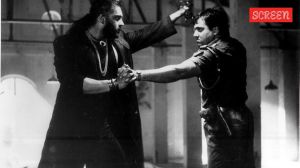East India Company
PUNJABI slam-bang will blare on. But scripts and films based in Kolkata are now bringing in strains of bhatiali and Rabindra Sangeet. For Sh...

PUNJABI slam-bang will blare on. But scripts and films based in Kolkata are now bringing in strains of bhatiali and Rabindra Sangeet.
For Shyam Benegal’s latest, AR Rahman has used classic Bengali elements—from bamboo flutes in a lullaby called Ghoomparani to a stanza of Tagore’s Ekla Chalo (Walk Alone) in Bengali. ‘‘Punjabi music has reached saturation point,’’ says the 38-year-old composer, talking about his score for Netaji Subhash Chandra Bose—A Forgotten Hero. Of course, Rahman had assistance from Benegal, who picked pop icon Nachiketa Chakraborty to lend his vocals for Ekla Chalo.
But this is not Rahman’s first brush with Bengali. ‘‘Mani Ratnam insisted on a folk-based melody for Yuva,’’ he says of the saccharine Neem Neem. And he can’t stop raving about classical singer Ajoy Chakraborty, who worked with him during the production of the yet-to-be-released Water. Though Rahman’s earliest memories of bhatiali (songs composed and sung by boatmen in east Bengal) go back to the ’60s, when the legendary Salil Chowdhury gained demigod status in Chennai. ‘‘My father worked with him during Chemmeen,’’ he says of the 1965 Malayalam cult film.
Most identify Chowdhury as the brilliant composer who gave us Dil Tadap Tadap Ke (Madhumathi) and Zindagi Kaisi Hai Paheli (Anand), but his anthems for the Indian Theatre Peoples Association (IPTA) and left-wing pieces are other reasons why composer Shantanu Moitra idolises him. ‘‘Who could be so red, so modern and so ideological? He’s India’s Dylan,’’ says 36-year-old Moitra, who is currently working on the soundtrack for Vidhu Vinod Chopra’s Parineeta. Set in 1962, about a married woman’s scarlet life in Kolkata, the script also inspired Moitra to use Phule Phule, another popular Tagore number.
Long before Bollywood met Parineeta, composer Debojyoti Mishra was adding the final touches to Rituparno Ghosh’s debut Hindi feature, Raincoat. Having worked with Chowdhury for over a decade, the 41-year-old says, ‘‘Salilda was a very strong influence in my early years. Too strong. It will take another 13 years to shake it off and start afresh.’’ Hear him in the supine, minimalist Mathura Nagarpati and Piya Tora Kaisa Abhimaan, rendered by Shubha Mudgal.
‘‘There’s a resistance against contemporary influences in Bengali music,’’ explains Mishra.‘‘The melodies and compositions have remained pure. That innocence attracts people.’’ Maybe, then, this love affair won’t die out soon.




- 01
- 02
- 03
- 04
- 05



























